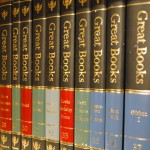“My Pandemic Book Club Changed the Way I Think about Literature — and Community.” Christopher Frizzelle writes about the goods that came from a Zoom-based book group he’s been leading. I tend to see such digitally-mediated communities as “tinned fruit” goods, but his description of their conversations makes them sound very worthwhile.
“This Is the Way the Humanities End.” Brian Rosenberg responds to a truly terrible review of Roosevelt Montás’s new book: Rescuing Socrates: How the Great Books Changed My Life and Why They Matter for a New Generation. I don’t agree with all the distinctions that Rosenberg draws, but he offers an excellent critique of Louis Menand’s blinkered view of what literature is good for.
“Are the Great Books Truly Great?” Responding as well to Menand’s book review, Jessica Hooten Wilson and Ryan Murphy debate this question over at Pairagraph.
“Why Galesburg Has No Money.” Joe Hicks offers a perfect case study of the broken model of development that Charles Marohn and the folks at Strong Towns have been warning about: “We started re-developing our cities to accommodate increasing car ownership and ended up building cities that are unsustainable and cannot support themselves. We built big houses with big yards out on the edge of town. We started to build big box stores and a mall on the edge of town, putting downtown out of business. All those big stores and houses required big new roads, new water infrastructure, and took up a lot of land.”
“Pecans Rain on the Just and the Unjust.” Elizabeth Corey describes the pleasures of a bumper crop of pecans: “I realized as we worked that this unmerited harvest was a kind of epiphany, a showing of God’s grace. We – who had been “too busy” to look up from our preoccupations – were being showered with a gift: material for pies, pesto, and candies; for toasting in butter and sprinkling on ice cream sundaes; for stirring into homemade bourbon pecan ice cream. And the quantity was far more than we could use by ourselves: we would have to bag up the nuts and give them to our family and friends.”
“Made Perfect: Ability and Disability.” The new issue of Plough Quarterly is excellent. Start with Peter Mommsen’s editorial on whose lives count as fully human, and don’t miss Victoria Reynolds Farmer’s searing essay on how she has learned to receive the Good News who came in a body.
“We Need a Second Cut of ‘Don’t Look Up.’” Ross Douthat puts on his director’s hat and outlines a revised plotline for the recently released film.
“A Good Place To Be: A Local Bar Can be More than a Place to Get a Drink.” David Mills writes an ode to his local, townie bar: “Unlike a chain restaurant, a townie bar/public house pushes the average person into worlds we don’t know well. We live in small worlds, mostly people like us — family, old friends, people at church and work, maybe a few neighbors, other members of a club. Even places that claim to exist for everyone, like churches, tend to serve a specific group. It’s hard to get away from people like you.”
“This is Not How Civil Wars Start.” James Pogue critiques the “extremism-watching” industry for not spending time with the people they fear and despise: “The people who make the best living by describing America’s descent towards civil violence tend to be those with almost no personal knowledge of the armed rednecks they think are leading us there.”
“The Philosopher’s Stone: The Enduring Legacy of Sir Roger Scruton.” Brandon M. recalls the work of Scruton on the two-year anniversary of his death: “At the epicenter of his concept of culture was the bedrock belief in beauty. Roger Scruton was the archenemy of ugliness.”
“The Genius of Ivan Illich.” Brian C. Anderson reviews David Cayley’s intellectual biography of Illich, and in the process, Anderson provides a good overview of Illich’s life and thinking.
“Terry Teachout, Wall Street Journal Drama Critic, Dies at Age 65.” James Hagerty remembers the life of a gifted yet down-to-earth writer: “Though he led a sophisticated life of culture in New York, Mr. Teachout retained some of his small-town earnestness. ‘I still wear plaid shirts and think in Central Standard Time,’ he wrote in his memoir. ‘I still eat tuna casserole with potato chips on top and worry about whether the farmers back home will get enough rain this year.’” As John Podhoretz puts it, “Terry possessed an extraordinary talent, all the more extraordinary because his life’s work was a defense of the value, meaning, and profundity of ordinariness.”
“The Gadfly.” Scott Thomas Beauchamp surveys the work of Byung-Chul Han and concludes that “Han gives us something better than direct and unsatisfying answers: he gives us the irritant, the grain of sand from which pearls of wisdom are formed.”





